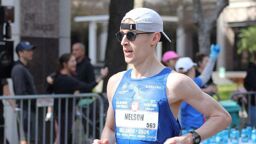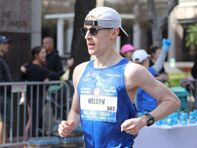Philip Batler just finished his senior year at Brown University, but when the ominous email arrived last month from President Christina Paxson, the track standout was incensed — and immediately started to mobilize. Brown announced it would be moving 11 varsity sports to club status, including indoor and outdoor men’s track and field and cross country. To Batler, the move was inexplicable. The men’s track and field was one of the more successful athletic programs at Brown, which won just 2.8 percent of Ivy League titles from 2009-18.
Insultingly, the eliminations were branded as part of the university’s “Excellence Initiative” to reshape its athletics department, which is a strange way to frame any downsizing plan. In the May 28 email, President Paxson said the decision to cut 11 varsity sports and elevate club coed sailing and club women’s sailing to the varsity level was based around multiple factors, including Brown’s commitment to promoting “gender equity and diversity.”
Apparently unbeknown to Brown, the men’s track and field team is the second-most racially diverse club on campus, behind the football team. It has more Black athletes, 11, than the lacrosse, baseball, hockey and crew teams combined.
There are also four openly LGBTQ members on the team. (Batler, a Massachusetts native, wrote a coming out essay for Outsports in 2017.)
Within hours, Batler and hundreds of alumni mobilized online to start pushing back against the decision. According to one current member of the team, a Facebook group with roughly 700 alumni was created that night. Op-eds were published; Brown Athletics’ Twitter account was overrun with messages; and even Malcolm Gladwell joined the campaign.
On Tuesday, Brown announced it was reinstating men’s track and field and cross country, citing the teams’ diversity and vital roles as points of entries to an Ivy League institution. Track and field is the least expensive youth sport, costing families an average of just $191 per year, according to a study by the Aspen Institute.
The reversal is a textbook example of how sustained and virulent public pressure can create change.
“You can’t accept injustice, and have to do everything you can to point it out, get as many people involved, and work against it,” Batler says. “When we knew we were in the right, we didn’t have any room in our mind to settle.”
When asked for comment about the reinstatement of men’s track and field and cross country to the varsity level, a Brown spokesperson referred me to President Paxson’s public letter outlining the change of heart.
For Batler, the fight to get men’s track and field and cross country back to the varsity level wasn’t just about allowing the teams to compete in the Ivy League. It was about preserving the group that made him feel like he belonged at an Ivy League institution, and ensuring other young gay athletes are afforded the same opportunities.
At his visit, he met an openly gay member of the team who was hanging out with his boyfriend, along with several of his teammates. Batler describes the encounter as an “ah-hah” moment that told him he belonged.
“When you think of who an Ivy League person is, and how they’re portrayed on TV, you think of these waspy guys who are wearing ugly Brooks Brothers suits. In high school, I did not think of that as me,” Batler says. “Then I showed up and met this funny gay guy who was there with his boyfriend. He reminded me of myself. I was like, ‘I do belong here.’”
Duke DiEugenio, a distance runner and rising senior, arrived at his “ah-hah” moment when he read Batler’s coming out piece. The two formed a quick friendship, bonding as two openly gay student-athletes at an institution where, despite its liberal reputation as the “Gay Ivy,” casual homophobia is still prevalent in some areas on campus, including the athletics department. Both Batler and DiEugenio say some student-athletes are “not the most accepting” with their language, causing discomfort to them and their peers.
To counteract that, Batler formed the Student Gay Athlete Alliance, a safe haven for queer athletes at Brown. With four openly LGBTQ members, the men’s track and field team is heavily represented at the regular meetings.
But if men’s track and field and cross country were demoted to club status, Batler says it was uncertain whether queer members of the team would’ve still been able to attend SAGA meetings, since its funding came from Brown Athletics. Wisely, Batler determined that was a better way to secure the club’s long-term existence, rather than relying on himself to “buy pizza every week” with spare change.
Disappointingly, Batler and DiEugenio say Athletics Director Jack Hayes was unaware of SAGA until they told him about it during this process. DiEugenio is hoping this experience serves as a turning point when it comes to communication and transparency between the department’s administration and student-athletes.
“It sounds like a basic thing, but having the administration become more familiar with the different groups we have within athletics, and the time and effort we put creating those communities,” DiEugenio says. “Prior to this discussion, they didn’t even know we existed. Our Athletics Director didn’t know the Student-Athlete Gay Alliance existed, which is an issue.”
An athletics department spokesperson did not immediately return a request for comment.

Originally, the team was slated to have a phone call Tuesday with Director Hayes, but then received word President Paxson would be joining as well. Prior to the call, the team decided they were unwilling to compromise, and each member prepared tough questions for the administration. When Paxson delivered the good news, they still ensured their voices would be heard, and addressed their issues with the original decision. Batler told Paxson about how meeting an openly gay member of the men’s track and field team attracted him to Brown, and allowed him to feel comfortable on campus.
She acknowledged him, calling his story “remarkable.”
“For Brown Athletics to only care about winning, everyone involved in sports knows winning is amazing, but it is not everything,” Batler says. “You need people like us to pave the way for future generations. They can’t call this ‘excellence’ and cut the most queer team we have at the school.”
As an upperclassman and team leader, DiEugenio says he wants to use the momentum generated by the reinstatement to further expand SAGA’s reach, and touch young LGBTQ people who are questioning whether would be able to fit in at a school like Brown — just like he was.
“The specific function that SAGA serves is to bring people together from across different sports teams,” he says. “I think it’s just as important to be reaching down the pipeline and finding new recruits as it is to reach horizontally across our student body and make other people feel comfortable at the place they’re already at.”
Batler would not have been able to find comfort at Brown without track and field. He says the Athletic Department does not have an openly gay male member on staff, depriving young LGBTQ athletes of mentors and role models. During his sophomore year, Batler remembers having a conversation about his personal life with his head coach, who simply told him it sounded like he was in a “real pickle.”
Batler says he knew his coach cared, but as a middle-aged straight guy, couldn’t really relate to an openly gay 20-something.
Batler’s teammates were his saving grace.
“I can go to a team party in full makeup and nobody is going to say anything,” he says. “They’ll just be like, ‘Oh, is that new eye shadow?’ And that’s just not common in athletics or even at Brown, unfortunately. Not being part of that team would’ve been terrifying.”
Philip Batler can be reached at, [email protected]. You can follow Duke DiEugenio on Instagram here. His email is, [email protected].



































